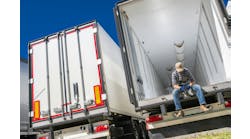My two previous blogs - Behind the wheel of a CNG-powered big rig and CNG fueling is straightforward but . . . - were devoted to my experiences driving a compressed natural gas (CNG) powered-Freightliner Cascadia 113 tractor hooked to a loaded van trailer and fueling a CNG vehicle. This blog will look at some of the maintenance issues associated with CNG-powered heavy trucks.
As you might expect, since CNG power is different from diesel power there are differences in maintaining each of these powerplants.
With near-zero emissions, spark ignited natural gas trucks are among the cleanest trucks on the road.
CNG trucks tend to be simpler to maintain as they are fewer emissions components, which reduces vehicle maintenance and downtime, I learned from Robert Carrick, manager of natural gas sales for Freightliner Trucks. Because natural gas engines employ spark ignition technology, there is no diesel involved so there no need for diesel particulate filters, a diesel oxidation catalyst or a selective catalytic reduction system, doing away with added complexity and maintenance requirements.
However, there are spark plugs to contend with because they are required to ignite the CNG fuel.
This adds spark plugs and coils which must be maintained - but that is not complicated, he noted. Plus, the valves in spark-ignited natural gas engines tend to need adjustment more frequently than in diesel engines.
Other pluses
Another plus for CNG-powered trucks is that the CNG fuel system is basically maintenance-free, said Carrick. Because it holds gas, the system doesn't require a lot of moving parts.
There's also an advantage for CNG during the winter months. With CNG trucks, the worry about diesel fuel jelling in freezing temperatures is removed.
Carrick said diesel and natural gas engines have about 80 percent common parts. CNG engines require some different parts and specific natural gas engine oil which typically must be changed about twice as often as diesel engine oil.
This is about every 15,000 miles for an ISL-G engine and about 18,000 miles for an ISX 12 G engine versus about every 35,000 miles for a diesel engine), he said.
ROI
It should be noted that the upfront cost for a natural gas heavy truck can be expensive, but that should come down as more and more of these vehicles are sold, bringing down production costs.
Carrick told me that the return on investment in a CNG heavy truck depends on a number of variables, in addition to maintenance costs. These include the capital investment, truck mission and utilization, size of the CNG tanks required to meet a given fuel range, vehicle fuel consumption and how long the trucks will be owned and operated.
"But the two primary factors are miles driven per year and cost of the fuel," he emphasized. "The more miles driven and the greater the cost delta, the faster you meet your ROI goals."
Freightliner has created a calculator to show how much money could be saved by switching to natural gas.




